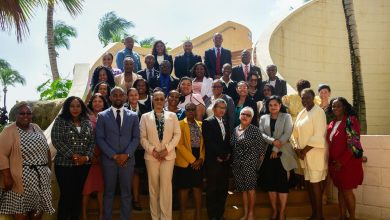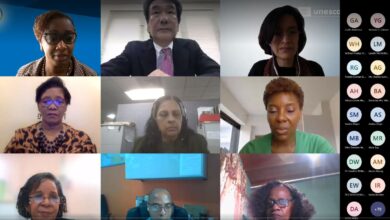It is my pleasure to welcome you to this important meeting which is essentially a follow up to the UN General Assembly Special Session on the Rights of the Child held in New York in May this year. It also provides an opportunity for the Caribbean to continue the process of building on the previous proposals for a Regional Framework to guide further initiatives in this area.
The Secretariat wishes to acknowledge the support from UNICEF for this meeting and in particular for its sponsorship of the Background paper that will be a focus of the discussions.
It is to be noted that the proposals from this meeting will be presented to the Seventh Meeting of the Council for Human and Social Development (COHSOD VII) that begins tomorrow. In this way, your decisions, based on empirical information and expert analysis and discussion, will be incorporated into the wider agenda of the COHSOD. No doubt, they will ensure that the work programme of the Directorate for Human and Social Development will reflect an even greater sensitivity to the priorities of our Region’s children.
In 2000, COHSOD IV, as most of you will know, approved as a theme for the work of the Directorate of Human and Social Development, Investing in Human Resources with Equity. Since then, every effort has been made to adopt an inter-sectoral approach to the activities that have been undertaken in the following areas: crime and security and demand reduction; mainstreaming gender into the core progamme areas of education, health, and labour; and in our approach towards developing a regional strategy for human and social development.
The issues that are the focus of this special session also directly concern the COHSOD, and find an apt niche in its inter-sectoral agenda. Indeed, issues such as child survival, early childhood education and development, and child protection already connect with some of the major activities of the work of the COHSOD.
Of direct relevance to your deliberations is the current response to HIV/AIDS in which the CARICOM Secretariat has been designated as coordinator of the Pan Caribbean Partnership against HIV/AIDS. The strategic framework which guides the policies of this partnership places emphasis on the reduction of mother to child transmission, care and treatment of people living with HIV/AIDS and on prevention through advocacy, education and outreach programmes, among others.
More recently, the Partnership negotiated for cheaper anti retroviral drugs with pharmaceutical companies and is considering the possibility of further reduction through the use of generics. Of special importance in the package is the provision for the acquisition of free drugs to all HIV/AIDS mothers to prevent mother to child transmission (MTCT) of the virus.
It is to be noted that the area of generics is of special interest to Guyana, which has embarked on a process designed to produce cheaper anti-retrovirals (ARVs). Whatever else may be achieved, reducing the spread of HIV/AIDS overall would have a positive effect in saving the lives of many of the Region’s children, as well as avert the trend of an increase in the number of orphans whose parents succumbed to this dreaded disease.
The area of crime, drugs and security also intersects with your discussions. A Caribbean Task Force on Crime and Security, mandated by Heads of Government and coordinated by the Directorate of Human and Social Development, shows how crime, linked to drugs and illicit arms, provide the main pillars of destruction of human lives. It is cause for increasing fear in the communities of our Region and a serious disincentive to economic investment and growth.
While the causes of crime are variable and are no doubt related to poverty, unemployment and a series of social and economic ills, the connection between crime and drugs is a plague. It is an erosive source of lawlessness that gives expression in widespread corruption that permeates all levels of society in our Region.
Of direct relevance to this special session is the extent to which it affects the child whose young father or older brother or even innocent mother or all of them, are the victims of this social malady. The Task Force has made several recommendations on the way forward that will be the focus of the discussion at the main session of the COHSOD.
Among the other programme activities that have a direct bearing on the discussions of this special session are:
a. The configuration of early childhood education being facilitated by our HRD activities, and which should be incorporated into the work of the Futures Policy Group (FPG), a special Group approved by the COHSOD to develop a regional strategy for Human and Social Development.
b. Family Life activities that fall directly within the mandate of the Caribbean Cooperation in Health, which are being developed in collaboration with the health and education specialists.
c. Activities related to gender mainstreaming that highlight the education of mothers, the prevention of abuse, and the pivotal roles of child care which need to be a joint venture, ideally undertaken by both parents.
I have just mentioned some of the areas of intersection between the main focus of your deliberations today, and the wider programme of the COHSOD. In so doing, it is clear that the Rights of the Child present a critical component of any social policy; and that the development of an appropriate social policy is one that must be inter-sectoral in scope, in keeping with the integrating theme – “Investing in Human Resources (especially our children) with Equity”. This theme reflects the Millennium Development Goals that provide the guiding principles for your work.
The CARICOM Secretariat is committed to facilitating this work, and we wish to thank all of you for being willing partners in this important venture.





